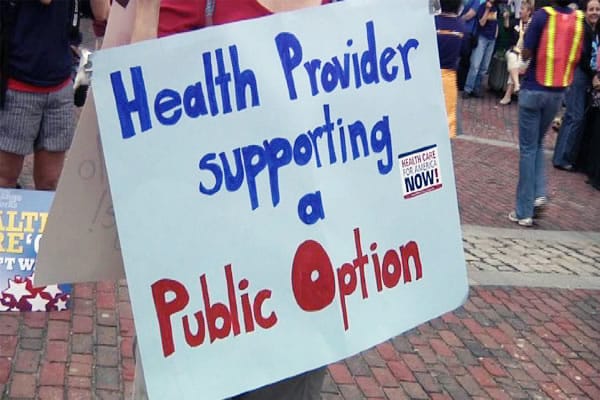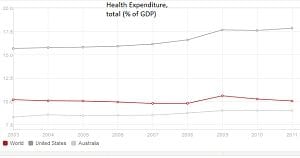Why Both Parties Are Wrong About National Health Care

Sign at a healthcare rally in Maine 2009 // Credit: Blip.tv

A recent Gallup poll says only 26% of independents are satisfied with the work the government is doing on healthcare along with 53% of democrats and 7% of republicans. The dearth of cross-partisan enthusiasm for the Affordable Care Act (ACA) or still further health care reform, dead in the water.
It's no secret that the ACA was heavily lobbied. As the Center for Responsive Politics notes, “During the course of 2009, the number of corporations, trade associations and other organizations that disclosed lobbying on the health care reform bills grew at an astounding rate. By the end of the fourth quarter when both the House and the Senate adopted versions of the bill, the number of clients had increased by nearly 300 percent, the Center for Responsive Politics found -- up to 1,541 clients.” Despite heavy lobbying efforts, it's become a very partisan issue.
The GOP has voted 35 times to repeal the ACA since 2011. Both sides have dug in their heels and decided that their solution is the right solution, but what if they're both wrong? What if the ACA doesn't go far enough?
In a recent article, Business Insider ranked the worlds best healthcare systems by country. Most of the 35 countries listed have a two tiered system. This means they have a public option where everyone can get their basic healthcare. Additionally, consumers have the choice of buying additional, private insurance if they're not satisfied with their coverage. While not perfect, this system gives the best of both worlds.
Still, how would we pay for it? In countries like Australia, the federal government institutes a 1.5% income tax. While that may seem like a lot, consider the following: “So if we put all of our health spending dollars into one giant insurance fund, we would be paying out an average of $8,290 for each man, woman and child in this nation. For that family of four, their share is $33,160. Think about what that means when the median household income is $50,000.”
This wouldn't be the bill the family sees, but rather the total amount being spent on behalf of the family.
If those numbers don't astound you, take a look at this graph, which compares total health expenditure between the US, the rest of the world and Australia. Source: World Bank

It's clear that, even with the ACA, we have a very serious healthcare problem in this country. This is obviously not the only solution, but it looks like a pretty darn good one. I'd like to hear what you think, what solution would you implement?



